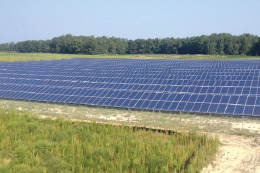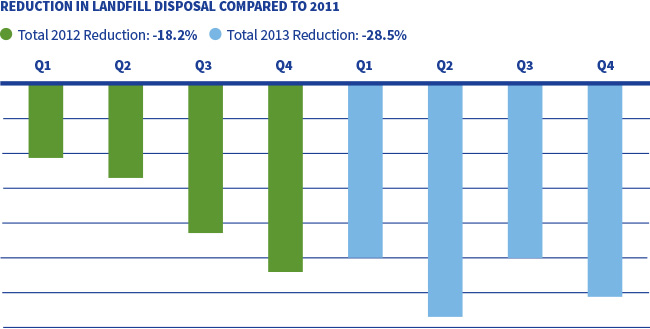In 2013, we worked to reduce our energy consumption and greenhouse gas emissions, increase our use of green building practices, support renewable energy, expand recycling and help our communities become more sustainable.
Energy Consumption & Emissions
As a large operator of facilities, we made investments that allowed us to use energy more efficiently. Key 2013 projects included upgrading HVAC equipment and related systems at three of our largest buildings. These investments, along with other factors, helped reduce our energy use compared to our baseline year of 2007. In 2013, electricity consumption at facilities where Fifth Third receives an energy bill fell 46 million kilowatt-hours (19 percent) relative to 2007. These facilities also reduced natural gas consumption by 210,000 million British thermal units (43 percent) relative to 2007. Based on the average emissions factors for electric power and natural gas in the United States, these energy savings correspond to a reduction in carbon dioxide emissions of 43,000 metric tons (27 percent) relative to 2007 emissions from these sources.
We also improved the methods we use to estimate our greenhouse gas emissions at locations where we are not directly billed for energy consumption (typically leased locations). Also, as part of our 2013 submission to the Carbon Disclosure Project (CDP), we had our Scope 1 and Scope 2 greenhouse gas emissions independently verified to ensure the integrity of our methodology. This helped increase our CDP Disclosure Score to 86 on a 100-point scale. We continue to monitor climate change-related developments as we work to improve our ability to manage the risks and opportunities related to climate change.
Green Building
In 2013, 12 of our banking centers earned Leadership in Energy & Environmental Design (LEED®) recognition from the U.S. Green Building Council® (USGBC), including six that earned LEED Silver. This increased our number of LEED certified facilities to 17. As we work to make all of our newly-planned, newly-built banking centers LEED certified, we became a corporate member of the U.S. Green Building Council and we began preparing two LEED Volume applications to more fully integrate LEED into the company’s business practices.
Renewable Energy
We supported renewable energy by purchasing renewable energy certificates (RECs) and financing renewable energy projects and companies. First, we purchased 60 million kilowatt-hours of RECs. Equivalent to 30 percent of the electricity consumption for which we are billed directly, the RECs are associated with the Lost Creek Wind Project in Missouri, a state where we do business. This purchase led the U.S. Environmental Protection Agency (EPA) to recognize Fifth Third Bank as a Green Power Partner and as a member of EPA’s Green Power Leadership Club. We were also ranked as the 29th largest purchaser of green power in the EPA’s September 2013 Fortune 500® Partners List. Our purchase also helped the City of Cincinnati be recognized as a 2013 Green Power Community of the Year.
Second, we expanded our financing for renewable energy in 2013 by providing in excess of $40 million to finance the construction and operation of utility-scale solar farms in North Carolina and Tennessee, including the 2.3-Megawatt Franklin Solar Farm. The electricity produced from these projects was sold to Duke Energy and the Tennessee Valley Authority.






